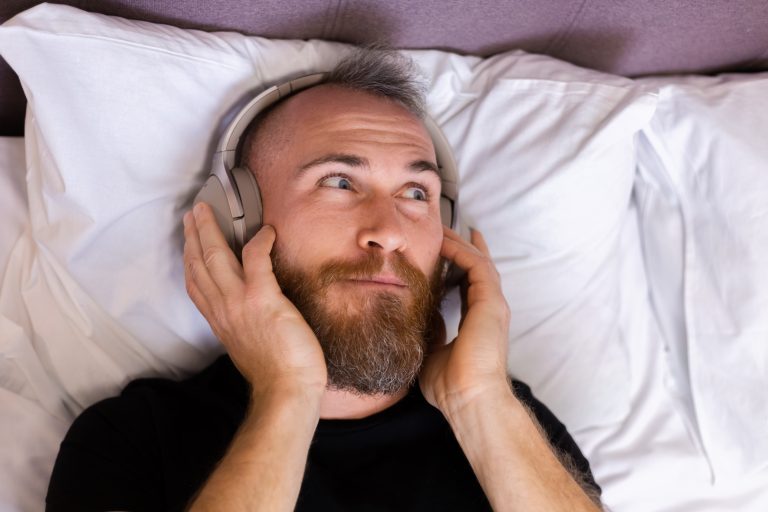


Horlama Nedir?
Horlama, uyku sırasında yayılan ve hava yollarındaki titreşimlerden kaynaklanan gürültülü bir ses olarak tanımlanabilir. Bu durum genellikle üst solunum yollarının daralması nedeniyle hava akışının engellenmesinden kaynaklanır. Solunum yollarındaki daralma ya da tıkanıklık, nefes alıp verme sırasında boğaz ve yumuşak doku yapılarının titreşmesine yol açar. Bu titreşimler, karakteristik horlama sesini oluşturur. Erkeklerde, kilolu bireylerde ve yaşla birlikte daha sık görülen horlama; genellikle kişinin çevresini etkileyen ve uykunun kalitesini düşürebilen hatta bazı durumlarda ciddi sağlık sorunlarına işaret edebilen bir durumdur.
Çeşitli yaş gruplarında ortaya çıkabilen horlama, sosyal bir sorun olmanın ötesine geçebilir. Sağlıklı bir uyku düzenini sekteye uğratmanın yanı sıra uyku apnesi gibi daha ciddi hastalıkların da habercisi olabilir. Horlama, basit bir boğaz sorunundan kaynaklanabilir ya da genetik özellikler, kilo fazlalığı, burun tıkanıklıkları veya uyku pozisyonundan da etkilenebilir. Düzenli olarak horlama şikayeti yaşayan bireylerin, altında yatan nedenin teşhis edilmesi için uzman bir hekime başvurması önerilir.
Horlama Neden Olur?
Horlama, uyku sırasında üst solunum yollarının daralmasına yol açan belirli durum ya da faktörlerin etkisiyle ortaya çıkar. Farklı nedenlerden kaynaklanabilen daralma, hava akışını zorlaştırır ve genellikle nefes alıp verme esnasında yumuşak dokuların titreşmesine neden olur. Horlamanın temel nedenleri kişinin anatomik yapısından yaşam biçimine kadar geniş bir çeşitlilik gösterir. Ağız ve boğaz yapısı, burun tıkanıklığı, uyku pozisyonu, kilo ve alkol kullanımı gibi faktörler horlamayı tetikleyebilir. Bazı durumlarda altta yatan sebep bir sağlık sorunu örneğin uyku apnesi olabilir.
Yumuşak damakta veya bademciklerde meydana gelen büyüme ve geniz eti gibi yapısal anormallikler, hava yollarını daraltarak horlama riskini artırır. Fazla kilo özellikle boyun çevresinde yağ birikimine yol açarak solunum yolunu daraltır ve titreşimleri artırır. Bunun yanında burun tıkanıklıkları, grip ve alerjiler gibi faktörler solunum yollarında direnci artırarak horlama sesine neden olur. Uyku pozisyonu da bu süreçte önemli bir etkendir. Özellikle sırtüstü yatmak, dilin geriye doğru kaymasına ve hava yollarını tıkamasına yol açarak horlamayı tetikleyebilir. Alkol ve sigara kullanımı, boğaz kaslarını gevşetir ve solunum yollarının daralmasına neden olur. Bunun sonucunda daha yoğun horlama meydana gelebilir.
Horlama Belirtileri Nelerdir?
Horlamanın en temel belirtisi, uyku sırasında çıkan düzenli veya düzensiz gürültülü sestir. Ancak horlama sadece bu sesle sınırlı bir sorun değildir. Horlama kimi zaman bireyin fark etmediği ya da göz ardı ettiği başka semptomlarla birlikte görülebilir. Sabahları ağız kuruluğu, boğaz ağrısı ve baş ağrısıyla uyanmak, horlamanın yaygın belirtilerindendir. Horlayan birey genellikle uyandıktan sonra kendini yorgun veya halsiz hisseder. Uyku kalitesinin bozulması nedeniyle gün içinde konsantrasyon bozukluğu ve dikkat eksikliği yaşayabilir.
Horlama aynı zamanda ciddi sağlık sorunlarının da habercisi olabilir. Özellikle nefes duraklamaları, ani uyanmalar, göğüs bölgesinde ağrı ve kalp çarpıntısı gibi belirtiler, uyku apnesi gibi rahatsızlıkların işareti olabilir. Sürekli ve yüksek sesli horlama hem bireyin çevresindekilerin uyku kalitesini etkiler hem de kişinin hayat konforunu düşüren bir etken hâline gelir.
Horlama Nasıl Teşhis Edilir?
Horlamanın teşhisi genellikle bireyin çevresindekilerden alınan bilgilerle başlar. Birlikte uyunan bir partnerin gözlemleri, doktorun ilk ipuçlarını almasına yardımcı olabilir. Horlamanın şiddetinin ve sıklığının ne olduğunun belirlenmesi için detaylı bir tıbbi öykü alınır. Fiziksel muayene sırasında kulak, burun ve boğazın yapısına özel olarak dikkat edilir. Özellikle burun tıkanıklığı, yumuşak damak yapısı veya bademcik büyüklüğü gibi durumlar değerlendirilir.
Bazı durumlarda horlamanın uyku apnesi gibi daha büyük bir sağlık sorunu ile bağlantısı olup olmadığını tespit etmek için ileri düzey testlere ihtiyaç duyulabilir. Polisomnografi ya da evde yapılan uyku testleri bu amaçla kullanılır. Polisomnografi; uyku sırasında bireyin nefes alma düzenini, oksijen seviyelerini, kalp atış hızını ve uyku döngülerini izleyen detaylı bir testtir. Bu yöntem, horlamanın ciddiyetini ve altta yatan nedenleri saptama aşamasında son derece etkilidir.
Horlama Tedavisi Nasıl Yapılır?
Horlamanın tedavisi, altta yatan nedenlere bağlı olarak şekillenir. Hafif düzeydeki horlamalar için yaşam tarzı değişiklikleri genellikle yeterlidir. Fazla kiloların verilmesi, düzenli bir uyku pozisyonu benimsenmesi ve alkol ile sigara kullanımının sınırlanması etkili çözümler sunar. Horlamanın burun tıkanıklığı veya solunum sorunlarından kaynaklanması durumunda burun açıcı spreyler veya özel cihazlar kullanılabilir. Burun bantları gibi basit çözümler ise solunum yollarını açık tutmaya yardımcı olarak horlamayı azaltabilir.
Daha ciddi vakalarda ise cerrahi müdahaleler gerekebilir. Burundaki deviasyon, geniz eti ya da bademcik büyümesi gibi anatomik engellerin cerrahi yöntemlerle düzeltilmesi, horlamayı kalıcı olarak hafifletebilir. Uyku apnesine bağlı horlama vakalarında, CPAP cihazı gibi pozitif hava yolu basıncı sağlayan cihazlar kullanılabilir. Bu cihazlar, hava yollarını açık tutarak solunum düzenini korur ve horlamayı önler.
Horlama Nasıl Geçer?
Horlama, yaşam tarzında yapılacak köklü değişikliklerle önemli ölçüde kontrol altına alınabilir ya da tamamen önlenebilir. İlk olarak kişinin fazla kilolarından kurtulması, boyun çevresindeki yağ birikimini azaltarak hava yolunun daralmasını engeller. Yeni bir uyku pozisyonu benimsemek örneğin yan yatmayı tercih etmek, horlamanın şiddetini düşürür. Ayrıca alkol ve sigara kullanımının sınırlandırılması ya da tamamen bırakılması, solunum yollarındaki tahrişi azaltarak horlamayı hafifletebilir.
Horlama sorunu yaşayan kişiler için özel olarak tasarlanan yastıklar, baş ve boyun pozisyonunu dengeleyerek daha iyi bir uyku deneyimi sunar. Dil ve boğaz kaslarını güçlendiren egzersizler yapmak, solunum yollarındaki yumuşak dokuların titreşimini azaltarak horlamayı hafifletebilir. İleri düzey vakalarda ise burun ve boğaz yapısını hedefleyen cerrahi tedavi yöntemleri kalıcı çözümler sunabilir.
Sonuç itibarıyla horlama, pek çok farklı nedenin bir araya gelmesiyle ortaya çıkan ve hem bireyi hem de çevresini etkileyen bir problemdir. Ancak zamanında teşhis ve uygun tedavi yöntemleriyle bu sorun büyük ölçüde kontrol altına alınabilir ve sağlıklı bir uyku düzeni oluşturulabilir.
Bize Mesaj Gönderin
Randevu Saatleri
Pazartesi – Cuma: 08:00 – 18:00
Pazar günleri ve resmi tatillerde kapalıyız.
İletişim
Yeni Mahallesi İntizam Sokak No:7 Pendik / İstanbul
0216 390 95 80
0505 372 09 26
Hasta Yorumları
Kliniğimizde, sıcak bir karşılama, şeffaf iletişim ve üstün hizmet kalitesiyle, diş sağlığı konusundaki tüm ihtiyaçlarınıza cevap vermeye hazırız.
Kaplamalarımla alakalı gitmiştim kaplamalarımın altında kistler oluşmuştu. İmplant takıldı şuan çok memnunum .Esra hanımdan önce 3 -4 tane dişçiye gittim ama hep problemler çıkardılar kaplamayı takarken dişlerimi kökten kırdılar. En son Esra hanımı önerdiler gittim ve çok memnun kaldım . Eli çok hafif ve işi bilen bir hekim Kanal tedavisi ile dişlerimin tamamını kurtardı. yakınlarıma,aileme tavsiye ettim . Ailemden de gidenler var.

zü...ç
TR
Esra hanıma komşumun tavsiyesi üzerine gittim iyi ki tavsiye etmiş iyi ki gitmişim çok memnunum implant yaptırdım tedavim hala da devam ediyor çok içten bir doktor hastasına güven veriyor ve çok rahatlatıyor ben de herkese tavsiye ederim

em...ş
TR
Sıkça Sorulan Sorular: “Horlama Operasyonu“
Horlamanın birçok nedeni olabilir, bunlar arasında boğaz ve yumuşak dokularda gevşeme, burun tıkanıklığı, aşırı alkol tüketimi, fazla kilo, uyku pozisyonu ve uyku apnesi gibi faktörler bulunmaktadır.
Horlamayı azaltmak veya önlemek için bazı yöntemler şunlardır: uygun uyku pozisyonunu seçmek (yan veya karın üstü uyumak), alkol tüketimini sınırlamak, kilo vermek, burun tıkanıklığını tedavi etmek, uyku apnesi gibi altta yatan tıbbi sorunları tedavi ettirmek.
Horlama, bazen uyku apnesi gibi ciddi bir sağlık sorununun belirtisi olabilir. Eğer horlamanız nefes almayı kesintiye uğratıyorsa veya uykunuz sırasında nefes alıp verme konusunda zorlanıyorsanız, bir doktora danışmanız önemlidir.
Evet, horlama tedavisi mevcuttur.
